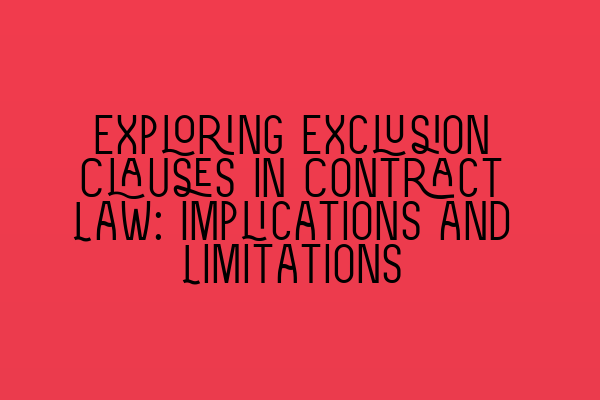Exploring Exclusion Clauses in Contract Law: Implications and Limitations
Welcome to SQE Contract Law! In this blog post, we will dive deep into the world of exclusion clauses in contract law, exploring their implications and limitations. Exclusion clauses are a vital component of contracts, as they serve to limit or exclude liability for certain types of loss or damage. As a solicitor, it is crucial to have a comprehensive understanding of these clauses to ensure the best possible outcomes for your clients.
Before we delve further, let’s clarify what exclusion clauses are. An exclusion clause is a contractual provision that seeks to restrict or exclude one party’s liability in the event of a breach or failure to perform the contract. These clauses are commonly found in commercial contracts but can also be present in consumer contracts.
One of the key implications of exclusion clauses is that they can potentially shift the balance of power between the contracting parties. For instance, a supplier may include an exclusion clause in their contract, limiting their liability if a product they provide is defective. This can leave the consumer at a disadvantage, as they may have limited legal recourse if they suffer any harm or loss due to the defective product.
However, it is important to note that exclusion clauses are subject to various legal limitations. Courts often closely scrutinize these clauses to ensure fairness and reasonableness. The Unfair Contract Terms Act 1977 and the Consumer Rights Act 2015 provide further protection to consumers against unfair exclusion clauses.
The first limitation is that exclusion clauses must be incorporated into the contract. It is not sufficient for one party to simply include a clause in their standard terms and conditions. The clause must be properly brought to the attention of the other party before or at the time of entering into the contract. Failing to do so may render the clause ineffective.
Another limitation is that exclusion clauses cannot exclude liability for death or personal injury resulting from negligence. This is a fundamental principle of contract law as it ensures that parties cannot escape liability for their negligent actions, which could cause harm or loss to others.
Reasonableness is also a significant factor when assessing the validity of an exclusion clause. Even if a clause is properly incorporated into the contract, the court will examine its reasonableness. The test of reasonableness involves assessing whether the clause was reasonably brought to the attention of the other party and whether it is fair and just to enforce the clause in the circumstances. The court will consider the bargaining power of the parties, the nature of the loss or damage that may arise, and any alternative remedies available.
It is crucial for solicitors to carefully review exclusion clauses in contracts, both from the perspective of their clients and the other party involved. A well-drafted and reasonable exclusion clause can protect your client’s interests, while an unfair or inadequate clause may leave the client vulnerable to excessive liability.
In conclusion, exclusion clauses play a significant role in contract law. While they can limit or exclude liability, they are subject to numerous limitations and must meet the test of reasonableness. As a solicitor, it is vital to understand the implications and limitations of exclusion clauses to provide the best legal advice to your clients.
We hope this blog post has provided you with valuable insights into exploring exclusion clauses in contract law. If you would like to further enhance your knowledge and skills in SQE Contract Law, we recommend checking out our related articles below:
– SQE 1 Practice Exam Questions
– SQE 1 Practice Mocks FLK1 FLK2
– SQE 2 Preparation Courses
– SQE 1 Preparation Courses
– SRA SQE Exam Dates
These resources will further your understanding of contract law and help you prepare for the SQE exams. Stay tuned for more informative blog posts from SQE Contract Law in the future.
